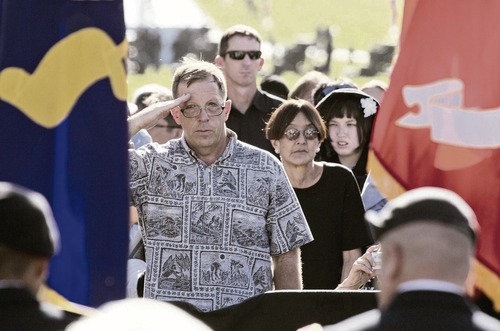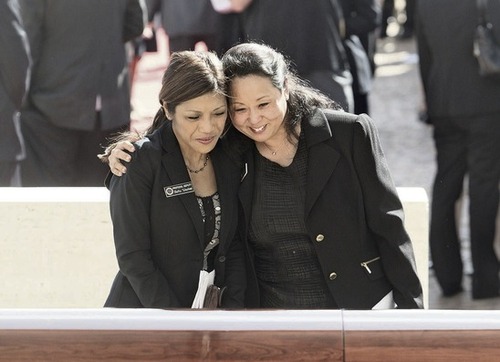They came because of his war service. Because of the racial barriers he broke. Because he was a titan in politics. Because he never forgot the little guy.
They came because he was their senator, almost like a member of the family. He had always been there and, it seemed, always would be.
More than 700 residents woke before dawn, braved long security lines and waited for hours Sunday to pay their respects to U.S. Sen. Daniel K. Inouye at a somber service at the National Memorial Cemetery at the Pacific at Punchbowl.
Several members of the public said while they had never met Inouye over his half-century in the Senate, they felt a special connection to him.
"He was a humble hero," said Wendi Chong-Viernes, 57, of Manoa.
Speaking before the service, Rudy Alvior, 45, of Kapahulu said Inouye helped put the islands on the national stage.
"He’s done so much for the state of Hawaii," she said. "To be here is a privilege."
Residents were shuttled to Punchbowl from the Alapai Transit Center, riding city buses whose electric route signs read, "Mahalo Dan."
Members of the public began arriving at the Alapai center as early as 4 a.m., and shuttles began leaving for Punchbowl three hours later.
Because of security restrictions, the crowd at the service was capped at roughly 1,000, including dignitaries, veterans, Inouye family members and other guests. It was not immediately clear, however, whether any residents who wanted to attend were turned away.
The service began AT about 10:30 a.m., shortly after the arrival of Inouye’s casket, draped in an American flag.
Members of the public snapped photos as the casket was solemnly carried to a canopy at the foot of the grand staircase at Punchbowl memorial. The crowd was hushed, and some wiped tears from their eyes.
President Barack Obama and first lady Michelle Obama had pulled in minutes earlier.
Members of the public said it was gratifying to see a veritable who’s who of national politics at the memorial, with Obama there along with Senate Majority Leader Harry Reid and a host of other VIPs.
"The president doesn’t really need to be here" while on vacation, said Nuuanu resident Fern Dalton, 33. "It just shows you the impact this must have had."
Dalton called the service moving and a fitting tribute to someone so beloved.
Members of the public sat in a designated area on the lawn at Punchbowl, the sun shining fiercely overhead.
But there were few complaints about the heat, or the security precautions or the lines.
It was worth it, attendees said.
"This is once in a lifetime," said Daryl Tomita of Palama.
Tomita and his wife, Gretel, brought their two sons — 9-year-old Dylan and 7-year-old Davis — to the service. The parents hope to instill in their boys just a few of the characteristics that Inouye had, they said.
Youngmee Park of Makiki teared up as she spoke about Inouye’s contributions to Hawaii. She said the service drove home for her the importance of cultivating another generation of strong leaders for the islands.
"It gave everybody a chance to say goodbye," she said, while also spurring people to think about the future.
Yvette Corpuz, 44, of Ewa Beach said Inouye helped break barriers for Asian-Americans — and other minorities, including a certain Hawaii-born president.
Corpuz got to the Alapai Transit Center AT about 5:10 a.m. and said there was already a line for shuttle buses.
The high turnout, she said, didn’t surprise her.
"He was such a good guy," she said of Inouye.
Audrey Woo, 64, never met Inouye, but heard him speak at her Hilo High School graduation. Back then, she said, much of his speech about foreign affairs went over her head.
But later in life she came to appreciate Inouye and all he did for Hawaii.
Woo said she and her husband, Russell, also 64, wanted to attend the service because Inouye was "such a great man for Hawaii and the nation."
Stephen Chinen, 58, of Mililani called Inouye his hero.
He learned about Inouye in grade school and can still remember watching Inouye deliver the keynote address at the Democratic National Convention in 1968.
But Chinen said it wasn’t until college that he really began to appreciate the courage Inouye showed on the battlefield and the barriers he overcame in Congress — and in life.
More recently Chinen dropped by Inouye’s offices in Washington, D.C., to try to meet Inouye in person and get him to sign a chapter titled "Integrity" in an inspirational book. The chapter’s title, Chinen said, embodied Inouye’s greatest attribute.
Inouye wasn’t in his office, but Chinen left the book and, a short time later, got it back — signed by Inouye — in the mail.
Robbie Robinson, 67, of Waikiki said it’s tough to name just one thing that made Inouye such an icon.
But if he had to, it would be "his courage, his valor in war," he said. "It was unbelievable."
A few years ago Robinson was in Zippy’s, and he saw Inouye eating lunch, his security staff seated beside him. Robinson laughed thinking on it Sunday, and said the moment typifies the unassuming and down-to-earth nature Inouye was known for.
Robinson’s wife, Bernadette, said Inouye made Hawaii proud and helped pave a way for younger generations of minorities to dream of a career in public service.
Robinson, 68, also said that what made Inouye so highly regarded was the way he could disagree agreeably, something that’s tough to find in Washington, D.C., today.
"He had the aloha spirit," she said. "You’re supposed to respect people and that’s what he did."






